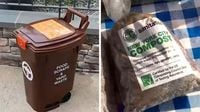New York City is taking a step back on its composting fines, allowing residents more time to get accustomed to the new regulations. Starting April 1, 2025, the city began issuing fines for those who failed to compost properly, with over 3,600 fines already handed out. However, in response to community feedback, officials have decided to pause most fines while focusing on education and outreach.
Under the new guidelines, only repeat offenders in buildings with more than 30 units will face fines, as the city aims to promote compliance rather than punishment. "Make no mistake: Composting continues to be mandatory in New York City. Through the end of the year, we will be distributing additional education materials and holding more community events about how to sort out waste," a statement from the mayor's office emphasized.
This pause comes after the city's curbside composting program expanded citywide in October 2024, requiring residents across all five boroughs to separate leaf and yard waste, food, and food-soiled materials from their regular trash. Residents are instructed to place their compostable waste in a brown DSNY bin or any container of 55 gallons or less with a secure lid, which is then collected by the sanitation department.
In a notable achievement, the sanitation department reported collecting a record 3.8 million pounds of compost just last week, around April 11, 2025. This significant amount highlights the city's commitment to sustainability and waste reduction.
Meanwhile, issues surrounding waste management are not limited to New York City. In Hai Duong city, Vietnam, improper waste sorting has led to serious injuries among environmental workers. The Hai Duong Urban Environment Joint Stock Company reported that several workers were injured by sharp objects, including needles from diabetes treatments, which were carelessly mixed in household waste.
The dangers posed by unregulated waste disposal are alarming. Workers collecting trash are at heightened risk of contracting infectious diseases, including tetanus, due to exposure to hazardous materials. Starting January 1, 2025, new regulations will impose fines ranging from VND 500,000 to VND 1 million for households and individuals who fail to classify their domestic solid waste properly.
These developments in both New York City and Hai Duong city underscore the critical need for effective waste management practices. As cities around the world grapple with increasing waste production and environmental concerns, the importance of public education and compliance with regulations cannot be overstated.
Back in New York, city officials are optimistic that the educational efforts will lead to better compliance once fines resume. The mayor's office has expressed a commitment to making composting a standard practice among residents, ensuring that everyone understands how to participate in the program effectively.
As composting becomes a vital part of urban waste management, the city plans to hold more community events and distribute educational materials to help residents understand the importance of composting. This initiative aims not only to reduce landfill waste but also to foster a culture of sustainability among New Yorkers.
In conclusion, while New York City pauses fines for composting violations, the focus shifts to education and community engagement. As the city works to improve compliance with composting regulations, the experiences in Hai Duong city serve as a stark reminder of the consequences of improper waste management. Both cities illustrate the ongoing challenges and responsibilities that come with modern waste disposal practices.





